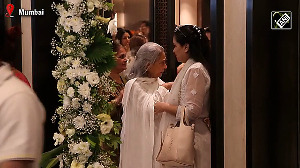Prime Minister Manmohan Singh will review the proposed bilateral trade and investment agreement between India and the EU at the meeting of the Trade and Economic Relations Committee (TERC) on May 29. Commerce and Industry Minister Anand Sharma has said that the talks are on the final stages.
Commerce and Industry Minister Anand Sharma has said that the talks are on the final stages.
"We will discuss this in the TERC meeting...we hope that we will be able to successfully close it soon," Sharma told reporters in New Delhi.
While the panel headed by the Prime Minister is in favour of inking Broad-based Trade and Investment Agreement (BTIA), the officials from both sides have remained engaged in resolving difference on key issues like opening of markets in auto and auto components, wines and spirits, and intellectual property rights and services.
Sharma said that the PM panel would also take up the issue of commencement of negotiations for India-Australia FTA, which has already been recommended by a joint study group.
The TERC would also examine setting up a joint study group for a possible free trade pact between India and the Common Market For Eastern and Southern Africa (COMESA).
The country has already implemented free trade pacts with South Korea and ASEAN and has inked comprehensive pacts with Japan and Malaysia.
Meanwhile in a CII function, Sharma reiterated India's stand that it will not accept any decision over and above what it agreed to under TRIPS in WTO.
He expressed concerns over the growing efforts of certain developed countries to enact Anti-Counterfeit Trade Agreement (ACTA) that goes beyond the provisions in TRIPS.
"We believe that certain provisions in this proposed Agreement are violative of TRIPS and we are firmly against such move, which falls outside the multilateral framework of WTO," he added.
On seizure of Indian generic medicines in EU while in transit to Latin America, Sharma said that the 27-nation bloc has assured him that they would amend their rules to stop such incidents and hopefully they would be able to do this soon.
He also said that at the World Intellectual Property Organization (WIPO), the EU has agreed to the country's demand to start negotiations for creation of international legal instruments for protection of India's generic resources, traditional knowledge, traditional cultural expressions.
Referring to data base of more than 2 lakh formulations in the traditional knowledge digital library (TKDL), Sharma hoped that the data base created in five languages- English, French, Spanish, German and Japanese, will enable search by global patent examiners to prevent misappropriation of India's traditional knowledge.
The TKDL project, which was initiated in 2001, provides information on traditional knowledge existing in the country, in languages and format understandable by patent examiners at International Patent Offices (IPOs), so as to prevent the grant of wrong patents.
TKDL acts as a bridge between the traditional knowledge information existing in local languages and the patent examiners at IPOs.










 © 2025
© 2025